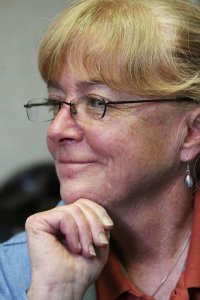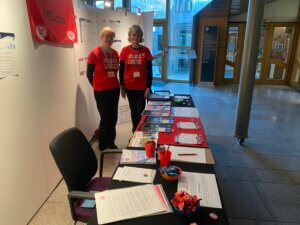Dr. Lucinda Bateman has treated over a thousand patients with chronic fatigue conditions since starting the Fatigue Consultation Clinic in 2000. She is the founder and Chief Medical Officer of the Bateman Horne Centre of Excellence (BHC) for ME/CFS and Fibromyalgia in Salt Lake City, Utah.
In 2015, Dr. Bateman served on the Institute of Medicine’s expert committee on ME/CFS that drew up the ground breaking report Beyond Myalgic Encephalomyelitis/Chronic Fatigue Syndrome: Redefining an Illness. She was a voting member of the Health and Human Health Service’s Chronic Fatigue Syndrome Advisory Committee (CFSAC) and serves on the editorial board of the journal, Fatigue: Biomedicine, Health and Behaviour.
How did you get involved in the field of ME research?
I became involved as a clinician in the early 1990’s because my sister became ill with ME/CFS in the 1980s. After medical school, I got my license to practice medicine in 1987 as I entered internal medicine practice, and was appalled to learn that no one seemed able to help her. I became involved in ME/CFS research in 2002 when I joined the Phase III clinical trial of Ampligen in the U.S. as a principal investigator.
Can you tell us about some of your current research into ME?
Since 2015, the team at BHC has focused on two areas.
The first is collaborating with funded scientists who need patient recruitment for their studies. This is important because expert clinicians may be in the best position to determine which patients are most appropriate for enrollment in clinical trials. This goal has allowed us to collaborate with almost a dozen scientists as clinical experts who recruit and define the patients for biomarker studies. Most recently, the U.S. NIH has funded collaborative research centers, and we are part of two centers as clinical collaborators.
Our second focus is designing original studies that will “objectify” the IOM/NAM (National Academy of Medicine) diagnostic criteria that were published in 2015 after an evidence-based review of the scientific literature. So, we are hoping to do research that shows how to measure reduced function, PEM, cognitive impairment and orthostatic intolerance.
How will biomarkers for ME help improve the lives of people with the illness?
The scientific support for how to diagnose and care for patients with ME/CFS has floundered for at least two decades without strong objective evidence to make a diagnosis and determine best treatments. Biomarkers, however you define them, are objective markers of the disease or disease process.
Every time a “biomarker” is identified, it supports and lends legitimacy to the diagnosis, and moves the science forward. We need biomarkers to progress the field.
Can you tell us about the work of the BHC Biomarker Research Project?
This project started in 2015 with a substantial private donation. This donation enabled BHC to recruit, evaluate, obtain questionnaire data and blood samples from almost 200 patients and to save the data for future research. Once this data was banked, BHC engaged in research collaborations with a number of scientists in the U.S., Canada and Japan.
The blood of patients who participated has been evaluated for gene expression, auto-antibodies, epigenetic and metabolomic changes, among others. We are hoping to combine this data for a larger meta-analysis in the future.
In Salt Lake City last year, the second annual ME/CFS Expert Clinician Summit agreed to prioritize the trial of low dose Naltrexone. How might Naltrexone help people with ME?
Low dose naltrexone (LDN) is a drug of special interest for treating conditions of neuroinflammation. It has been effective for the hyperalgesia (pain amplification) of fibromyalgia, and may prove helpful for other neuroinflammatory conditions, including ME/CFS.
Because the drug is generic, meaning there isn’t a pharmaceutical company in the wings willing to invest the millions necessary for clinical trials, the progress has been slow. Preliminary information has been promising, but we still need to learn more about how it works and who it has helped.
Fortunately, the drug is relatively inexpensive and well tolerated, so people can try it long before the definitive studies are done. There are several websites gathering public data, hoping to draw some conclusions without formal clinical trials. The jury is out so far but we are all hopeful.
Many people with ME complain of a lack of compassion and negativity from health professionals who struggle to treat them. What are the main barriers to compassionate care and how can these be overcome?
The most obvious barrier to compassionate care is incomplete comprehension of the illness and its consequences. We can hope that research progress, stronger biomarkers and scientific support will start to replace this ignorance with knowledge. In the meantime, we can make every effort to educate the public and medical providers about the serious nature of ME/CFS and the toll it takes on lives.
What action should public health authorities take to improve the life outcomes for people with ME?
People with ME/CFS need attentive health care and support from almost every resource. This includes families, schools, employers, public officials, clinicians, scientists and more. Our support for people with ME/CFS has been dismal and can easily be improved with incremental changes.







1 thought on “Meet the Scientist: Interview with Dr. Lucinda Bateman”
I am so thankful for all the work and time it too to get Bateman Horne Center up, funded and running. Knowing Dr.Bateman had first hand experience in MECFS with her sister makes her work more credible and God sent. I had the pleasure of meeting Dr. Bateman and the Staff at the center last July of 2019. She did a thorough exam, acquired personal history and performed credible testing to confirm MECFS, Fibromyalgia and the many impairments. This testing validated what I was going through and why. With this information I was able to show validity that helped me win my disability case. I pray that one day I will be able to work or volunteer at BHC. With that said, I believe in the work being done there and hope to be a part of it other than just doing research from home. Blessings to the staff and Dr Bateman.
Comments are closed.